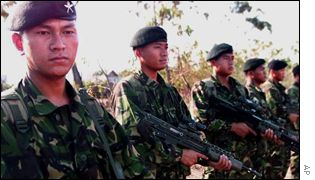
A former Gurkha is taking the Ministry of Defence to an employment tribunal in a discrimination test case which could cost the UK Government millions.
Lance Corporal Hari Thapa claims a monthly pension imbalance – just £58 against Army veterans’ £450 payment – amounts to racial discrimination.
He is demanding equal rights with British servicemen and £43,000 compensation for 15 years’ payments at the reduced rate.
Victory at the tribunal in Cardiff could spark a flood of claims from up to 30,000 Gurkhas and 6,000 widows.
One report put the potential bill to the government at up to £2bn.
A British passport holder stationed at Brecon, Mr Thapa from Cwmbran, south Wales, was angered by the MoD’s basic salary rate of £17.50 per month during service and the £58 pension after discharge in 1997.
He was recruited to the armed forces under a 1947 tripartite agreement between the UK, India and Nepal, which links Gurkhas’ pay and pensions to those in the Indian Army.
But the MoD insists the payments are adequate because most Gurkhas retire back to Nepal, where the cost of living is considerably less than in the UK.
‘Second class’ soldiers
It is the latest case as the Gurkhas – a troop of which is currently peace-keeping in Afghanistan – continue to put the UK Government under pressure to pay up.
Another tribunal in Suffolk, brought by an aggrieved former Gurkha lieutenant from Essex, is due to deliver its judgement soon.
And in September 2001, members of the Gurkha Army Ex-servicemen’s Organisation took to the Nepalese Supreme Court to have the MoD reverse a decision to issue payments through banks instead of local welfare centres.
Mr Thapa, 38, told BBC Radio Wales: “I feel Gurkhas are treated as second class citizens.
“The Gurkhas have been here a long, long time as the best soldiers in the world.”
He also alleges he received “second rate” medical treatment, a lower resettlement grant on discharge and worse tax benefits than those enjoyed by regular troops.
Born in Hampshire, the former Queen’s Own Gurkha TransportBrigade serviceman could have joined the British Army and claimed the higher rate of pension enjoyed by equivalent UK lance corporals.
But he followed in the footsteps of his Gurkha father, who was killed in Borneo fighting alongside UK servicemen.
Wife Nicola Thapa said: “They seem to be second class citizens compared to the British Army but are classed as the very best soldiers.
“If we fail, we are going to take it to the House of Lords, so it’s going to go all the way.”
Commission backing
Opening the case, Robin Allen QC said it was “shocking and unlawful” the MoD had given the reduced sums.
“Discrimination is so much a part of the institution of the Army that it seems unable to face up tothe consequences and eradicate every last trace of it,” he said.
“There is no reason why, because a soldier is from a different country and has brown skin, that he has to be treated differently.”
Mr Thapa’s case is being backed by the Commission for Racial Equality, said the Ministry of Defence’s responsibilities under the Race Relations Act 1976 outweigh the terms of the tripartite agreement.
But the MoD claims the act does not cover the Gurkhas as they are recruited and discharged in Nepal.
Liberal Democrat defence spokesman Paul Keetch said: “The MoD must recognise that it cannot treat 21st century soldiers like 19th century conscripts.
“The Gurkhas are entitled to the same pay and benefits as ordinary British soldiers.
“The special historical arrangement which allows the MoD to treat Gurkhas as second class soldiers must end.”
The MoD declined to comment on the case pending at Cardiff, which is expected to last two weeks.
The tribunal will analyse thousands of pages of documents, Acts of Parliament dating to the 17th century and the constitutional position of the Army.